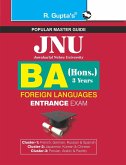The Global War on Terrorism (GWOT) is creating an ever-increasing role for US Army Special Operations Forces (ARSOF). This fact is evident with the approved increase in Special Operations force structure in the 2006 Quadrennial Defense Review. With the global nature of the current war, the demand for culturally attuned and foreign language capable Soldiers have never been higher. Dubbed "the long war," GWOT early lessons learned identified an increased need for various foreign languages at greater proficiency levels. As the US Army component of USSOCOM has the preponderance of forces with foreign language capabilities, this study focuses on the selection method for foreign languages taught to ARSOF. This thesis' central research question is: Is the current model or methodology for foreign language selection for ARSOF relevant and effective for the global nature of operations today and the future? This thesis examines the current methodology for foreign language selection for ARSOF, and compares that model to similar models of like purpose. History shows a tendency in SOF to react to foreign language requirements vice anticipate them. Proficiency is increasing in initial language training, and to some degree in maintaining proficiency; however, the selection process determining the languages taught receives little attention.








